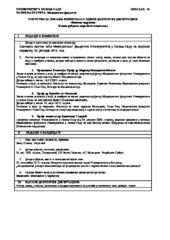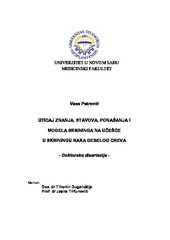Приказ основних података о дисертацији
Uticaj znanja, stavova, ponašanja i modela skrininga na učešće u skriningu raka debelog creva
The influence of knowledge, attitude, practice and screening models on participation in colorectal cancer screening
| dc.contributor.advisor | Dugandžija, Tihomir | |
| dc.contributor.advisor | Trifunović, Jasna | |
| dc.contributor.other | Miladinov-Mikov, Marica | |
| dc.contributor.other | Damjanov, Dragomir | |
| dc.contributor.other | Petrović, Vladimir | |
| dc.contributor.other | Gudurić, Branimir | |
| dc.contributor.other | Ač-Nikolić, Eržebet | |
| dc.creator | Petrović, Vasa | |
| dc.date.accessioned | 2016-05-28T14:42:41Z | |
| dc.date.available | 2016-05-28T14:42:41Z | |
| dc.date.available | 2020-07-03T13:25:49Z | |
| dc.date.issued | 2016-04-15 | |
| dc.identifier.uri | http://www.cris.uns.ac.rs/DownloadFileServlet/Disertacija145430990973193.pdf?controlNumber=(BISIS)99953&fileName=145430990973193.pdf&id=4867&source=NaRDuS&language=sr | sr |
| dc.identifier.uri | https://nardus.mpn.gov.rs/handle/123456789/5365 | |
| dc.identifier.uri | http://www.cris.uns.ac.rs/record.jsf?recordId=99953&source=NaRDuS&language=sr | sr |
| dc.identifier.uri | http://www.cris.uns.ac.rs/DownloadFileServlet/IzvestajKomisije145430991951977.pdf?controlNumber=(BISIS)99953&fileName=145430991951977.pdf&id=4868&source=NaRDuS&language=sr | sr |
| dc.description.abstract | Uvod. Rak debelog creva predstavlja 9,7% svih malignih bolesti u svetu, i drugi ili treći je po učestalosti u onkološkoj strukturi obolevanja, u zavisnosti od pola. Skrining, ili sekundarna prevencija populacije u prosečnom riziku ima centralnu ulogu u kontroli kolorektalnog karcinoma. Cilj. Utvrditi nivo znanja, stavove i ponašanje u odnosu na rak debelog creva i njihov uticaj na odaziv na skrining raka debelog creva, u zavisnosti od primenjenog modela skrininga. Materijal i metode. U istraživanje je pozvano 1.213 osoba oba pola, starosti 50-74 godine, za učešće u studiji znanja, stavova i ponašanja (KAP studija) u odnosu na rak debelog creva, popunjavanjem upitnika (Sessa A). Formirane su tri grupe prema modelu skrininga: populacioni - model 0; oportuni skrining uz kontakt ispitanika sa medicinskim osobljem, bez dodatnih informacija o bolesti, skriningu i testu – model 1; oportuni skrining kada se uz kontakt sa medicinskim osobljem dobija informacija o bolesti i skriningu, uz prikaz izvođenja testa - model 2. U ovoj studiji je kao skrining metoda korišćen imunološki test stolice -Wondfo FOB.Obrada podataka je rađena statističkim programom SPSS (version 13). Značajnost razlika je testirana parametrijskim (t-test, ANOVA) i neparametrijskim (Mann-Whitney U test) testovima, dok se komparacija kategoričkih varijabli vršila χ² testom i Fisher Exact testom. Test-retest analiza je rađena Cohen's Kappa testom. Rezultati. Od 1.213 pozvanih, 666 (55%) osoba je prihvatilo učešće u KAP studiji. Više od polovine (54,5%) ispitanika ima ukupan skor znanja manji od 50%. Nivo znanja, sociodemografske karakteristike, procena sopstvenog rizika obolevanja, stav u odnosu na korist testa, stepen sopstvenog rizika obolevanja i mogućnosti prevencije raka debelog creva, nisu faktori koji utiči na participaciju u skriningu kolorektalnog karcinoma. Najvažniji faktor za učešće u skriningu u ovom istraživanju je kontakt i razgovor sa lekarom o bolesti, prevenciji i skrining testu.Odaziv u skrining, u odnosu na celokupno pozvanu populaciju je 51,2%. Od ispitanika koji su popunili anketni upitnik, participacija u skriningu je 93,4%. Statistički značajno manji odaziv u skriningu je u modelu 0 (12%) i modelu 1 (6%) u odnosu na model 2 (1%). Zaključak. Poznavanje bolesti, faktora rizika i mogućnosti prevencije generalno je oskudno, ali ne utiče na participaciju u skriningu. Faktor koji utiče na visok odaziv u skrining kolorektalnog karcinoma je kontakt i razgovor sa medicinskim osobljem, pre svega sa lekarom. | sr |
| dc.description.abstract | Introduction. Colorectal cancer represents 9.7% of all malignancies in the world and it is second or third in frequency in oncological structure depending on the sex. Screening, or secondary prevention of the average risk in the population has a central role in the control of colorectal cancer. Aim. Determine the level of knowledge, attitudes and behaviour in relation to colon cancer and their impact on turnout for colorectal cancer screening, depending on the applied screening model. Material and method. There were 1213 people of both sexes aged 50-74 years participating in this study of knowledge, attitudes and practice (KAP studies) in relation to colorectal cancer, by filling in the questionnaire (Sessa A). Three groups were formed with respect to model screening: population - model 0; opportunistic screening involving the contact of patients and medical staff, without receiving additional information about the disease, screening and test - model 1; opportunistic screening involving the contact of patients and medical staff while receiving information about the disease and screening, and explaining the test performance - model 2. In this study, a screening method used was fecal occult blood test - Wondfo FOB. Data processing is performed by the statistical program SPSS (version 13). The significance of differences was tested by parametric (t-test, ANOVA) and nonparametric (Mann-Whitney U test) tests, while the comparison of categorical variables was performed with χ² test and Fisher Exact test. Test-retest analysis was performed with Cohen’s Kappa test. Results. Out of all the 1213 participants, 666 (55%) of them accepted to participate in the KAP study. More than half of them (54.5%) have a total score of knowledge less than 50%. The level of knowledge, socio-demographic characteristics, assessment of the risk of the disease, the attitude towards the benefit of the test, degree of the risk of disease and opportunities for prevention of colorectal cancer, are not factors in deciding to participate in the screening of colorectal cancer. The most important factor for the participation in the screening in this study is the contact and conversation with the doctor about the disease, prevention and screening test. The turnout for the screening, in relation to the number of people who participated is 51.2%. Out of those who completed the questionnaire, participation in the screening is 93.4 %. Statistically significantly lower response in the screening is in model 0 (12%) and in model 1 (6%) in relation to model 2 (1%). Conclusion. Knowledge of the disease, risk factors and prevention opportunities are generally scarce, but do not affect the participation in screening. The factor influencing the high turnout for colorectal cancer screening is contact and conversation with the medical staff, primarily the doctor. | en |
| dc.language | sr (latin script) | |
| dc.publisher | Универзитет у Новом Саду, Медицински факултет | sr |
| dc.rights | openAccess | en |
| dc.rights.uri | https://creativecommons.org/licenses/by-nc-nd/4.0/ | |
| dc.source | Универзитет у Новом Саду | sr |
| dc.subject | neoplazme debelog creva | sr |
| dc.subject | Colonic Neoplasms | en |
| dc.subject | Attitudes | en |
| dc.subject | Practice | en |
| dc.subject | stavovi i ponašanje | sr |
| dc.subject | Health Knowledge | en |
| dc.subject | procena rizika | sr |
| dc.subject | faktori rizika | sr |
| dc.subject | ranootkrivanje karcinoma | sr |
| dc.subject | masovni skrining | sr |
| dc.subject | okultno krvarenje | sr |
| dc.subject | participacija pacijenata | sr |
| dc.subject | Risk Assessment | en |
| dc.subject | Risk Factors | en |
| dc.subject | Early Detection of Cancer | en |
| dc.subject | Mass Screening | en |
| dc.subject | Occult Blood | en |
| dc.subject | Patient Participation | en |
| dc.subject | znanje o zdravlju | sr |
| dc.title | Uticaj znanja, stavova, ponašanja i modela skrininga na učešće u skriningu raka debelog creva | sr |
| dc.title | The influence of knowledge, attitude, practice and screening models on participation in colorectal cancer screening | en |
| dc.type | doctoralThesis | en |
| dc.rights.license | BY-NC-ND | |
| dcterms.abstract | Дуганджија, Тихомир; Трифуновић, Јасна; Гудурић, Бранимир; Миладинов-Миков, Марица; Дамјанов, Драгомир; Петровић, Владимир; Aч-Николић, Ержебет; Петровић, Васа; Утицај знања, ставова, понашања и модела скрининга на учешће у скринингу рака дебелог црева; Утицај знања, ставова, понашања и модела скрининга на учешће у скринингу рака дебелог црева; | |
| dc.identifier.fulltext | https://nardus.mpn.gov.rs/bitstream/id/34542/IzvestajKomisije2679.pdf | |
| dc.identifier.fulltext | https://nardus.mpn.gov.rs/bitstream/id/34543/Disertacija2679.pdf | |
| dc.identifier.fulltext | http://nardus.mpn.gov.rs/bitstream/id/34542/IzvestajKomisije2679.pdf | |
| dc.identifier.fulltext | http://nardus.mpn.gov.rs/bitstream/id/34543/Disertacija2679.pdf | |
| dc.identifier.rcub | https://hdl.handle.net/21.15107/rcub_nardus_5365 |



